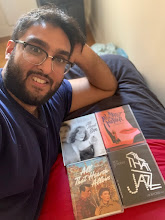Veer-Zaara is a story of romantic rebellion curtailed by honor and duty. Zaara Haayat Khan (Zinta) is a Pakistani young woman who defies her parents to travel to India to spread the ashes of the woman who raised her. In India, she meets Squadron Leader Veer Pratap Singh (Khan) and over the next few days Veer and Zaara fall in love, as he helps complete her task. However, Zaara is facing an arranged marriage back in Pakistan, so the two separate. Back in Pakistan, however, Zaara's mind keeps going back to Veer. I wanted to deconstruct my favorite scene in the film where Zaara tells her mother Miriam (Kirron Kher) about Veer. This scene uses tracking shots, different angles, and editing to complement the dialogue and thematic elements.
As the scene (embedded above) begins, we have Divya Dutta (playing servant/Zaara's friend Shabbo) in the foreground towards the left, Preity Zinta in the middle, and Kirron Kher directly in front of her. Then Chopra delivers a very slow tracking shot. The camera does a smooth, gradual zoom-in towards Zaara and Miriam as Shabbo oohs and aahs over the jewelry (all antiques, FYI). She mentions Zaara's fiance Raza (played by Manoj Bajpai) having everything, and that Zaara is lucky to be marrying him. The camera zooms past Shabbo during her lines, indicating how irrelevant the jewelry and the wealth are to Zaara. Chopra is using the frame to relay Zaara's perspective, rather than through a close up or giving Zaara any lines to contradict Shabbo. Throughout the scene, Zaara remains still and in her place. Keeping her in that position highlights how trapped she is by her circumstances, but her mind is still hers enough to entertain thoughts of Veer (who shows up through dialogue heard as voiceover in Zaara's mind).
After Shabbo says her lines, the camera continues towards Zaara and her mother, who also waxes poetic about the fiance. Again, just as she finishes, the camera zooms past her and turns towards Zaara. Just as the camera is able to get Zaara to fill the frame, Veer's voice is heard: "There is a man across the border who will give his life for you." Then Zaara asks her mother if she would die for her husband (Boman Irani). This line ends the tracking shot, and it's also the first line that Zaara even speaks. What follows is a series of shots-reverse shots as Zaara and Miriam talk about whether Miriam would give her life for her husband and vice versa. Chopra employs over-the-shoulder shots, keeping both women in the frame.
 |
| Over Miriam's left shoulder |
 |
| Over Zaara's right shoulder |
Chopra cuts back towards the women in profile, but the camera is further away than it was earlier; the women are far from each other. Miriam gets up to leave, and the camera zooms in towards Zaara (cue Veer's voiceover line from earlier). Just as the camera reaches Zaara, she delivers the line that completely changes the scene: "But I know someone who will willingly give up his life for me." Chopra cuts to another wide shot, this time from a different angle. Now we have Miriam in the foreground, Zaara still in the middle and Shabbo in the background. Before the camera was usually situated on Zaara's right side; finally we're getting a shot from directly in front of her.
 |
| Starting the tracking shot... |
 |
| ...ending the tracking shot. |
Zinta's restraint allows for Kirron Kher to go bigger. Chopra cuts back to Miriam, who then walks right back to where she was. It's a curious bit of direction. It would have been simpler to show Miriam coming back into the frame, rather than cutting back to her just to show her walk towards Zaara. I think Chopra is highlighting the seriousness of the situation. Her lecture to Zaara isn't just an angry rant; I think there's some genuine fear about what could happen to this family. Zaara remains calm but defiant. Kirron Kher overpowers the frame, as she relays the stark reality. But for Zaara, the reality has changed. Chopra zooms in during the dialogue, really emphasizing the stakes in this conversation. Then Zaara's father calls from off-screen ("Begum.") He is a specter over the film, and I don't think he is even introduced until after this scene.
The final shot of this scene is a sharp return to the wider angle. Miriam stands, and pleads with Shabbo to talk some sense into Zaara. As Miriam delivers her final, commanding lines, Chopra provides her lines with a sense of dread through a gradual zoom-in. The camera is at a low angle, allowing for Kher to tower over the frame ("Now, you cannot change [your future], nor can God.") Miriam storms out, and the camera whips around to catch Shabbo moving towards Zaara. Again, the actors move to match the camera's movement. Shabbo asks Zaara what's going on, and Zaara responds confidently but also a little fearfully: "It's love, Shabbo. It doesn't come with reason."
On the page, this scene is dialogue-heavy, with a few people talking in the room. It does move the plot forward, by showing that Zaara is resisting her arranged marriage. Chopra's camera makes this scene cinematic through use of tracking shots and careful editing. Zaara hardly moves in the scene, making the other characters revolve around her. She's steadfast in her love for Veer, even though her world is closing. This scene in Veer Zaara showcases how Yash Chopra is delicate in his direction, using his visual style to complement his themes.
Like what you read? Please like my blog at Facebook.com/MathurMarquee. Also, follow me on Twitter @HippogriffRider. Agree? Disagree? Sound off in the comments below!



No comments:
Post a Comment